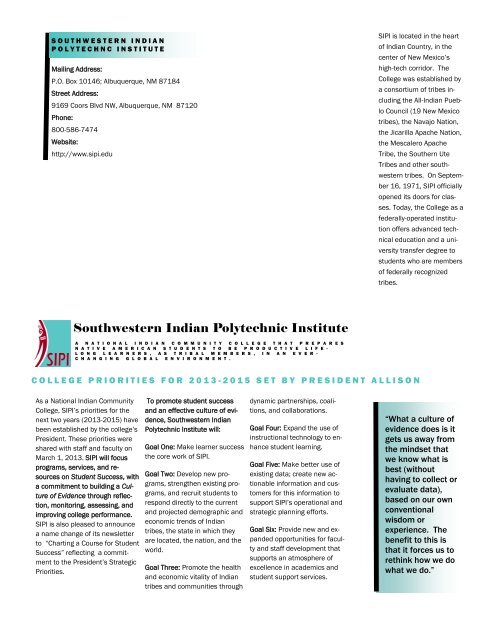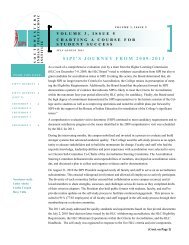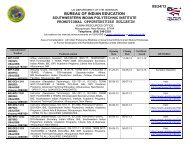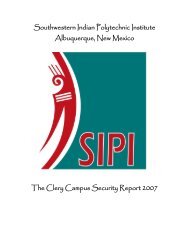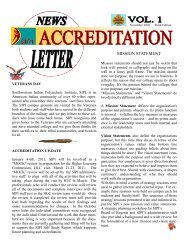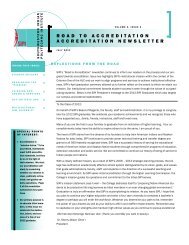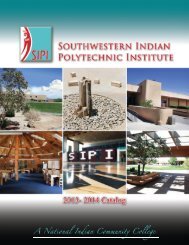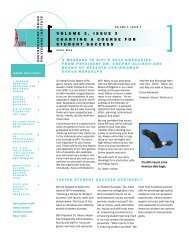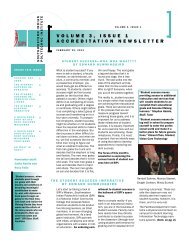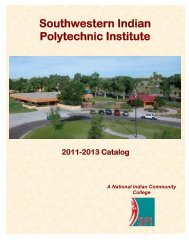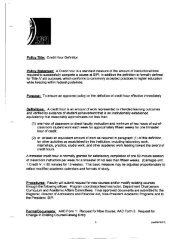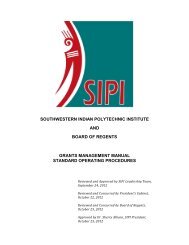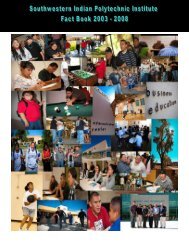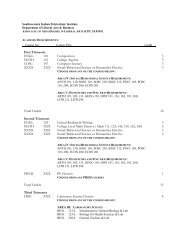volume 3, issue 2 charting a course for student success
volume 3, issue 2 charting a course for student success
volume 3, issue 2 charting a course for student success
Create successful ePaper yourself
Turn your PDF publications into a flip-book with our unique Google optimized e-Paper software.
S O U T H W E S T E R N I N D I A N<br />
P O L Y T E C H N C I N S T I T U T E<br />
Mailing Address:<br />
P.O. Box 10146; Albuquerque, NM 87184<br />
Street Address:<br />
9169 Coors Blvd NW, Albuquerque, NM 87120<br />
Phone:<br />
800-586-7474<br />
Website:<br />
http://www.sipi.edu<br />
SIPI is located in the heart<br />
of Indian Country, in the<br />
center of New Mexico’s<br />
high-tech corridor. The<br />
College was established by<br />
a consortium of tribes including<br />
the All-Indian Pueblo<br />
Council (19 New Mexico<br />
tribes), the Navajo Nation,<br />
the Jicarilla Apache Nation,<br />
the Mescalero Apache<br />
Tribe, the Southern Ute<br />
Tribes and other southwestern<br />
tribes. On September<br />
16, 1971, SIPI officially<br />
opened its doors <strong>for</strong> classes.<br />
Today, the College as a<br />
federally-operated institution<br />
offers advanced technical<br />
education and a university<br />
transfer degree to<br />
<strong>student</strong>s who are members<br />
of federally recognized<br />
tribes.<br />
Southwestern Indian Polytechnic Institute<br />
A N A T I O N A L I N D I A N C O M M U N I T Y C O L L E G E T H A T P R E P A R E S<br />
N A T I V E A M E R I C A N S T U D E N T S T O B E P R O D U C T I V E L I F E -<br />
L O N G L E A R N E R S , A S T R I B A L M E M B E R S , I N A N E V E R -<br />
C H A N G I N G G L O B A L E N V I R O N M E N T .<br />
C O L L E G E P R I O R I T I E S F O R 2 0 1 3 - 2 0 1 5 S E T B Y P R E S I D E N T A L L I S O N<br />
As a National Indian Community<br />
College, SIPI’s priorities <strong>for</strong> the<br />
next two years (2013-2015) have<br />
been established by the college’s<br />
President. These priorities were<br />
shared with staff and faculty on<br />
March 1, 2013. SIPI will focus<br />
programs, services, and resources<br />
on Student Success, with<br />
a commitment to building a Culture<br />
of Evidence through reflection,<br />
monitoring, assessing, and<br />
improving college per<strong>for</strong>mance.<br />
SIPI is also pleased to announce<br />
a name change of its newsletter<br />
to “Charting a Course <strong>for</strong> Student<br />
Success” reflecting a commitment<br />
to the President’s Strategic<br />
Priorities.<br />
To promote <strong>student</strong> <strong>success</strong><br />
and an effective culture of evidence,<br />
Southwestern Indian<br />
Polytechnic Institute will:<br />
Goal One: Make learner <strong>success</strong><br />
the core work of SIPI.<br />
Goal Two: Develop new programs,<br />
strengthen existing programs,<br />
and recruit <strong>student</strong>s to<br />
respond directly to the current<br />
and projected demographic and<br />
economic trends of Indian<br />
tribes, the state in which they<br />
are located, the nation, and the<br />
world.<br />
Goal Three: Promote the health<br />
and economic vitality of Indian<br />
tribes and communities through<br />
dynamic partnerships, coalitions,<br />
and collaborations.<br />
Goal Four: Expand the use of<br />
instructional technology to enhance<br />
<strong>student</strong> learning.<br />
Goal Five: Make better use of<br />
existing data; create new actionable<br />
in<strong>for</strong>mation and customers<br />
<strong>for</strong> this in<strong>for</strong>mation to<br />
support SIPI’s operational and<br />
strategic planning ef<strong>for</strong>ts.<br />
Goal Six: Provide new and expanded<br />
opportunities <strong>for</strong> faculty<br />
and staff development that<br />
supports an atmosphere of<br />
excellence in academics and<br />
<strong>student</strong> support services.<br />
“What a culture of<br />
evidence does is it<br />
gets us away from<br />
the mindset that<br />
we know what is<br />
best (without<br />
having to collect or<br />
evaluate data),<br />
based on our own<br />
conventional<br />
wisdom or<br />
experience. The<br />
benefit to this is<br />
that it <strong>for</strong>ces us to<br />
rethink how we do<br />
what we do.”


